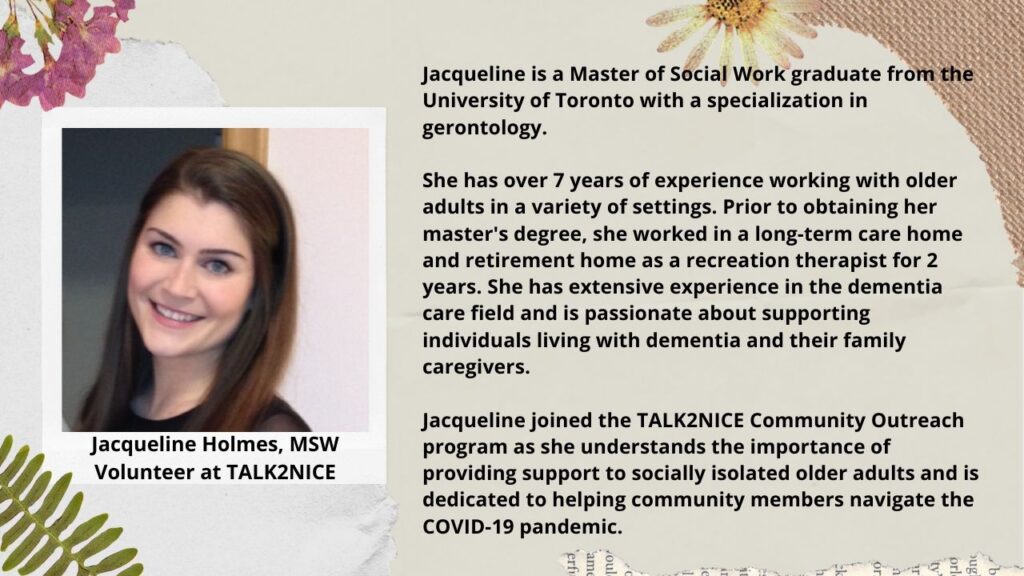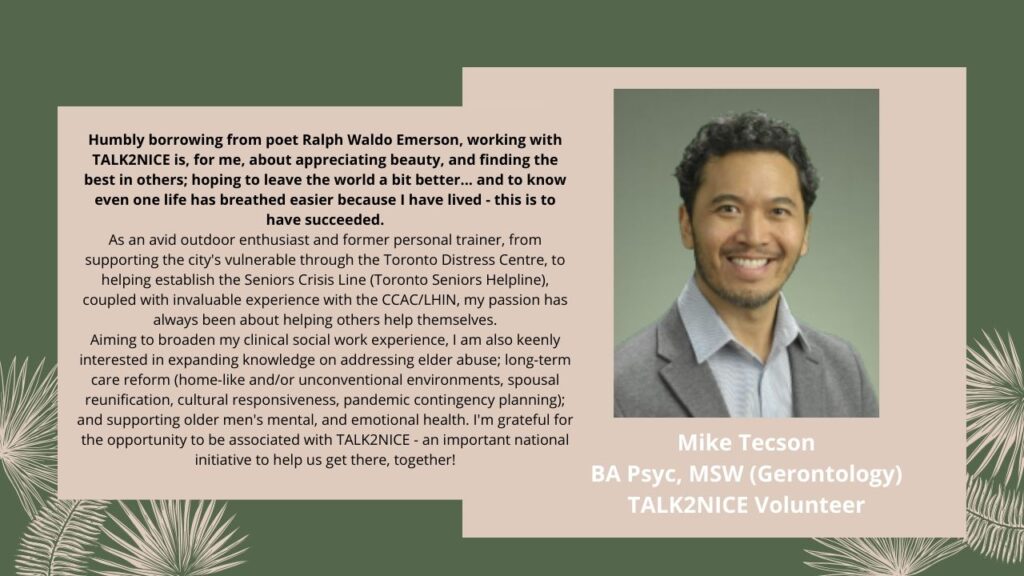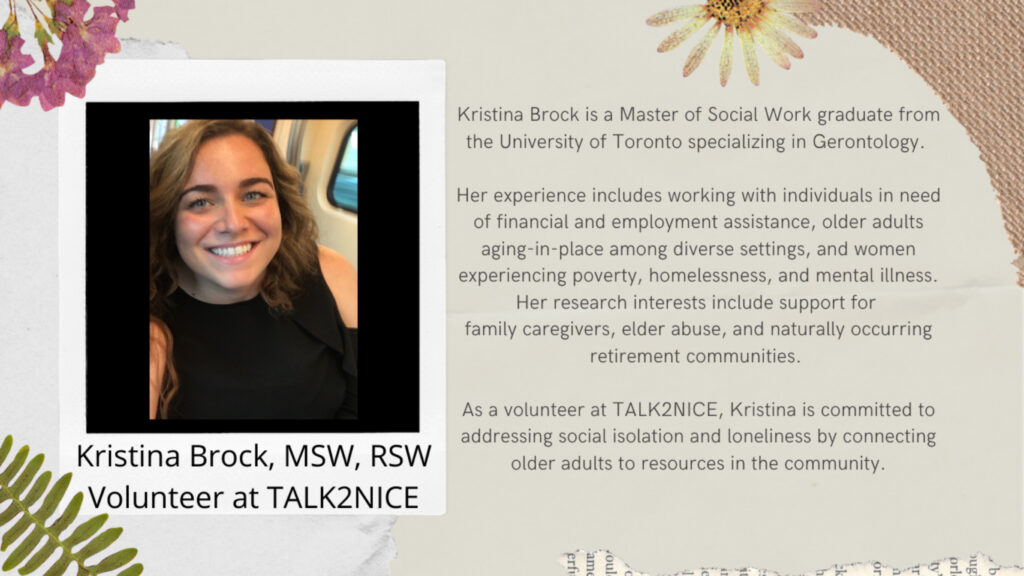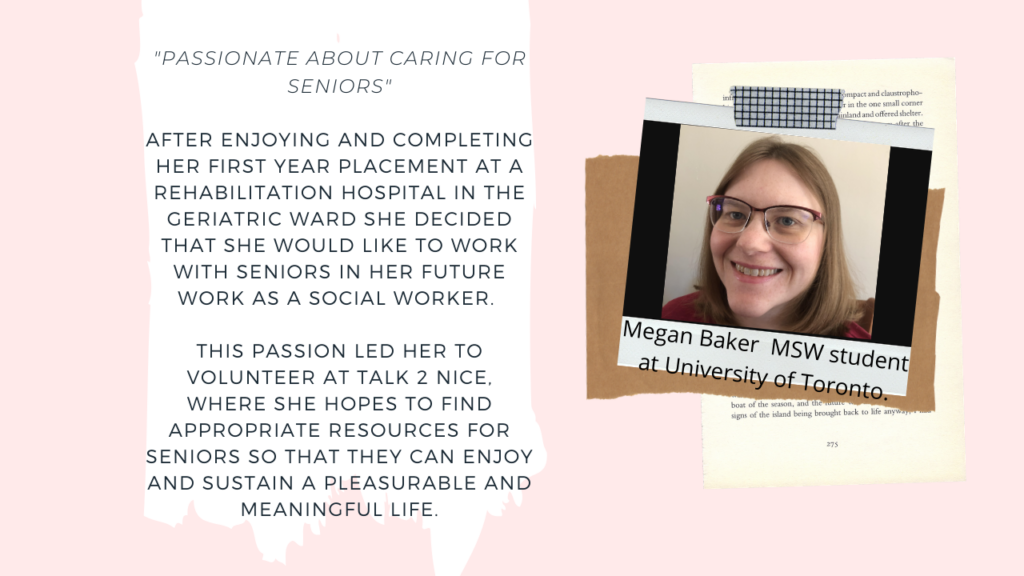TALK2NICE volunteers provide a sense of community for older adults experiencing increased social isolation due to COVID-19
Categories: Alumni + Friends, FacultyWhen the public was told to practice social distancing to slow the spread of COVID-19, leaders at the National Institute for Care of the Elderly (NICE) knew that older adults — many of whom were already struggling with loneliness — would likely suffer.
In response, it set up TALK2NICE, a phone line and virtual community of volunteers from across Canada who regularly check in with older adults at risk to ensure they have up-to-date information and are able to navigate the systems set up to help them. In addition to providing the older adults with a sense of community, the volunteers — which include a number of FIFSW social work students — help ensure they have access to counseling and support by trained social workers.
Jason Ferreirinha (MSW 2020), an FIFSW graduate who pursued the Master of Social Work program’s gerontology Field of Study, is now working as the program manager for TALK2NICE, helped shape all aspects of the call centre, from the program promotion to privacy protocols and the establishment of program’s long-term goals.
“Studies conducted before the pandemic found that isolation and loneliness have a negative impact on mental health and even led to increased mortality rates of up to 30%, which is similar to the rates associated with smoking and obesity,” says Ferreirinha. “NICE’s research has shown that isolation was a daily occurrence for many seniors prior to the pandemic.”
Ferreirinha (pictured below) developed experience working with older adults during his practicum placement at Baycrest Health Sciences, where he worked with Dr. Adriana Shnall, Program Director of Baycrest@Home and Chair of the Caregiving Group at NICE. “I responded to a wide range of concerns from community members who, for various reasons, often found themselves without regular human contact,” he said.
TALK2NICE’s team of 18 volunteers came together quickly. Many of them were already actively helping members in their communities, but what they noticed, says Ferreirinha, was that while picking up and delivering groceries and medication was important, many older adults and persons with disabilities lacked regular contact withother people. In response, NICE partnered with agencies such as UHN’s OpenLab to mobilize volunteers who could provide grocery delivery service, while NICE volunteers helped fill the social gap.
“A lot of older adults who were at risk for isolation in the community or in residential care settings did not have access to the internet, and so our support needed to be phone based and online,” says Ferreirinha. “We have tried to ensure that Individual volunteers regularly speak to and ‘check in’ with the same person as part of this program.”
Ferreirinha credits Professor Emeritus and NICE’ Scientific Director Lynn McDonald and NICE Network Manager Raza Mirza (a sessional lecturer at FIFSW) for initiating the program. He says that both Mirza and Laura Tamblyn-Watts, a member of NICE’s board of directors, and CEO of CanAge, emphasized the troubling outcomes associated with isolation in his classes this past spring. TALK2NICE’s work has been supervised by FIFSW Professor Emeritus Elsa Marziali, who has extensive experience in online counseling and virtual support programs.
“Many callers have expressed that aside from personal support workers and delivery services, TALK2NICE, has been their only consistent contact beyond their four walls,” says Ferreirinha. “We at TALK2NICE have learned a lot too. Through our exchanges with callers, we have gotten a first-hand glimpse into the day-to-day experiences of community members who are hopefully, living through a once in a lifetime pandemic. They have also helped us contextualize a lot of the things we learned during our MSW program. It has truly been a moving and powerful experience for our team.”
So what is next? Ferreirinha says he has received great feedback from community partners and callers from across the country:
“With team representation from British Columbia, Alberta, Saskatchewan, Ontario, and growing, I am confident that our trained outreach team will continue to make a meaningful difference in the lives of Canadians as we respond to the pandemic, as we recover and as we move towards a new normal.”
>Click here to learn more about TALK2NICE
The above article draws from text on the TALK2NICE program provided by Jason Ferreirinha (pictured above).
Talk2Nice: a spotlight on 4 of the program’s volunteers




